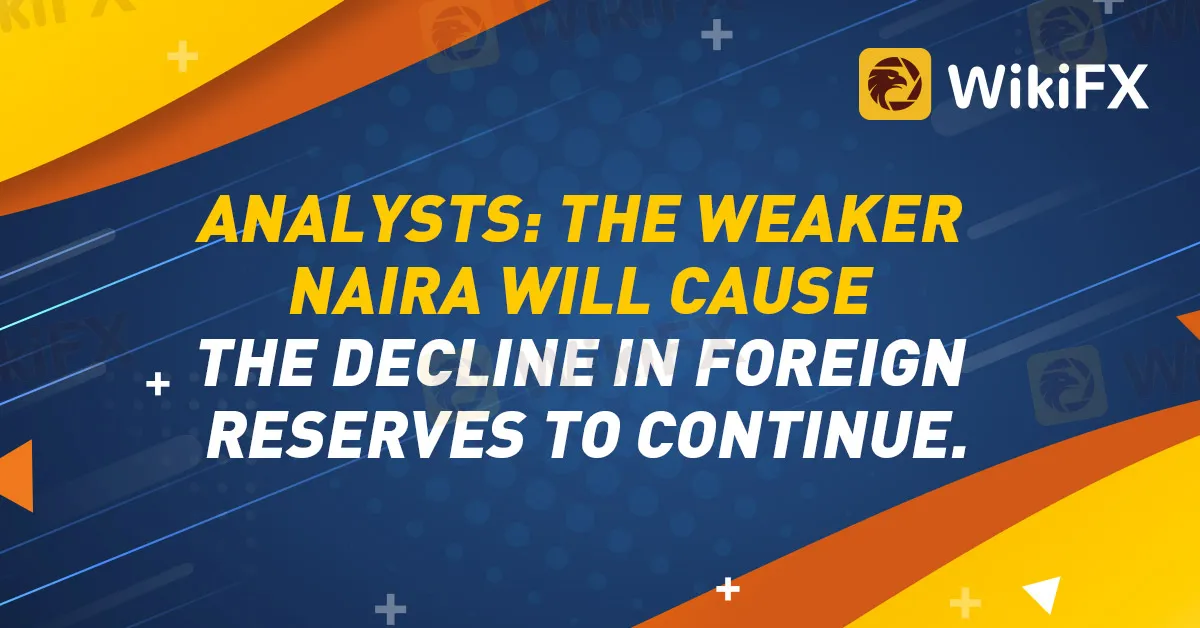简体中文
繁體中文
English
Pусский
日本語
ภาษาไทย
Tiếng Việt
Bahasa Indonesia
Español
हिन्दी
Filippiiniläinen
Français
Deutsch
Português
Türkçe
한국어
العربية
ANALYSTS: THE WEAKER NAIRA WILL CAUSE THE DECLINE IN FOREIGN RESERVES TO CONTINUE
Abstract:According to reports, it would take some time before Nigeria's foreign reserves start to recover from the recent fall.

According to reports, it would take some time before Nigeria's foreign reserves start to recover from the recent fall.
The Central Bank of Nigeria (CBN) released data on Monday showing that by March 23, 2023, Nigeria's FX reserves would have decreased by $93 million, or 2.53%, month over month.
According to the CBN, on February 23, 2023, FX reserves fell to $36.70 billion.
According to CBN data, the nation's FX reserves also decreased by 3.46 percent from the $37.06 billion they were on January 3, 2023, when the year began.
Due to Nigeria's failure to produce enough dollars to meet its needs, the largest economy in Africa has seen a fall in its dollar savings since last year.
Experts have ascribed the sustained decline of the naira value at all sectors of the dollar markets to the nation's ongoing loss of FX reserves.
The naira fluctuated between N750 and N770 last week on the black market, while it was quoted at N461.3 last week in the official Investors and Exporters' FX window (I&E), down from N461.8.
“This week, we expect to witness persistent pressure on the Naira across all market groups,” the experts at United Capital predict, given that FX headwinds will persist as dollar earnings remain low.
According to investment banking firm Cordros Capital, Nigeria's failure to expand its FX reserves and match the demand would endure over the short-to-medium term. There is no “good signal that suggests the pre-pandemic levels.”
The government's internal forex generation has continued to be undermined by low crude oil production and high premium motor spirit (PMS) under-recovery costs, while foreign portfolio investors (FPIs), who have historically supported supply levels in the official market, have stayed away because of the forex management policy.
The CBN said that it was confident that its many programs, the Naira-4-Dollar program, the RT-200 FX program, and other initiatives designed to promote remittances, would continue to improve the addition to external reserves and increase liquidity.
The rebate on both programs (the RT-200 FX program and the Naira-4-dollar program), in our opinion, is very unattractive to entice exporters and diasporans to the official window given between the official and illicit markets.
Foreign portfolio investment (FPI) and foreign direct investment (FDI) are currently at their lowest levels in more than five years, according to Afrinvest, thus the CBN should shift its attention to capital control regulations and the multiplicity of the currency window.
Despite the CBN's refusal to agree to the parallel market foreign currency rates, the majority of unmet US dollar demands from the official market are shifted to the parallel market. On the black market, the dollar to naira as reached 750 naira to the dollar. This represents an increase of 0.66 percent above the N755/$1 record set in session.
The International Air Transport Association estimates that foreign airlines are stuck with the CBN with $744 million (AITA).
Both producers and exporters have criticized the CBN for rationing.

Disclaimer:
The views in this article only represent the author's personal views, and do not constitute investment advice on this platform. This platform does not guarantee the accuracy, completeness and timeliness of the information in the article, and will not be liable for any loss caused by the use of or reliance on the information in the article.
Read more

The Impact of Interest Rate Decisions on the Forex Market
Interest rate changes determine currency attractiveness, influencing capital flows and exchange rate trends. Understanding this mechanism helps investors navigate the forex market effectively.

March Oil Production Declines: How Is the Market Reacting?
Oil production cuts in March are reshaping the market. Traders are closely watching OPEC+ decisions and supply disruptions, which could impact prices and future production strategies.

How to Calculate Leverage and Margin in the Forex Market
Leverage amplifies both potential profits and risks. Understanding how to calculate leverage and margin helps traders manage risks and avoid forced liquidation.

RM1.29 Million Lost in ‘C Baird VIP’ WhatsApp Scam
A 43-year-old company auditor and subcontractor in Malaysia became the latest victim of an elaborate investment scam after losing RM1.29 million to a fraudulent scheme promoted via WhatsApp.
WikiFX Broker
Latest News
The Withdrawal Trap: How Scam Brokers Lure Victims into Paying More
FCA to Investors: Think Twice Before Trusting These Brokers
Trump\s tariffs: How could they affect the UK and your money
Trump gambles it all on global tariffs he\s wanted for decades
TradingView Brings Live Market Charts to Telegram Users with New Mini App
Trump tariffs: How will India navigate a world on the brink of a trade war?
Interactive Brokers Launches Forecast Contracts in Canada for Market Predictions
Authorities Alert: MAS Impersonation Scam Hits Singapore
Stocks fall again as Trump tariff jitters continue
IG Group Acquires Freetrade for £160M to Expand UK Investment Market
Currency Calculator







